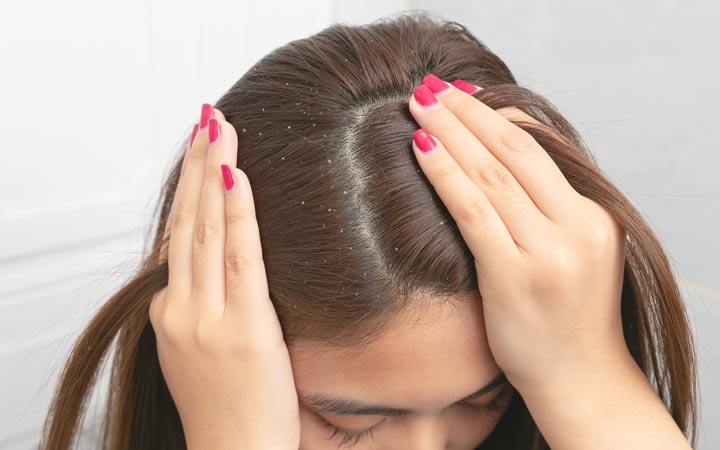Table of Contents
What Are Dandruff Treatments?
There are a few ways to get rid of dandruff – the first two being to brush your hair regularly and use a dandruff shampoo. When brushing your hair, be sure to use firm and steady strokes going from the scalp down. This will help carry the oil away from your scalp which is where the buildup of it and skin cells can cause dandruff in the first place. Additionally, brushing your hair along the strands rather than just the scalp will help keep your hair healthy and shiny.
Dandruff Shampoos
There are a variety of dandruff shampoos with different active ingredients, such as: Coal tar preparations (Denorex Therapeutic Protection, Neutrogena T/Gel, Scytera) Pyrithione zinc (Selsun Blue for Itchy Dry Scalp, Neutrogena T/Gel Daily Control Dandruff Shampoo, Head & Shoulders) Salicylic acid and sulfur (Sebex, Sebulex) Salicylic acid (Neutrogena T/Sal ) Selenium sulfide (Dandrex, Head & Shoulders Clinical Strength, Selsun) Ketoconazole (Extina, Nizoral A-D, Xolegel) If you find that one type of shampoo controls dandruff at first but is later ineffective, you may need to switch to a different type of shampoo.
Dandruff shampoo can cause an allergic reaction in some people. If you are pregnant or breastfeeding, do not use it. It can also make your skin more sensitive to sunlight. If using the shampoo, avoid contact with your eyes. Be sure to rub the shampoo into your scalp well and leave it on for at least five minutes before rinsing.
For those with Caucasian or Asian-American descent, the best way to combat dandruff is by shampooing every day but using a dandruff specific shampoo only twice a week. If that method doesn’t work, try alternating between shampoos that have different treatment ingredients.
As for those of Black descent, it’s often recommended to use a dandruff shampoo only once a week. Another tip would be to speak with a dermatologist about which type of shampoo would work best for your hair type and scalp.
Once your dandruff is under control, you may be able to reduce the usage of dandruff shampoo but it’s important to pay attention to any potential flare-ups.
Home Treatments for Dandruff
There are a few things you can do to help control dandruff, aside from using dandruff shampoo. For example, managing your stress could help with flaking, or you might try some of these natural treatments. They’re either moisturizing or they might be helpful against bacteria or fungi:
Coconut oil. Start by rubbing 3 to 5 teaspoons of this into your scalp, then wait an hour and shampoo your hair.
Aloe vera. Rub a bit into your scalp just before you shampoo your hair.
Apple cider vinegar: Mix a quarter cup of apple cider vinegar with a quarter cup of water, then pour it over your scalp.
There are a few home remedies that you can try to get rid of dandruff. Here are two of the most popular ones:
Lemon juice. Rub 2 teaspoons of lemon juice into your scalp, let it sit for a couple of minutes, then rinse. Follow that by mixing another teaspoon of lemon juice mixed with 1 cup of water and pouring it over your scalp.
Olive oil. Rub several drops of olive oil into your scalp, cover your hair with a shower cap, then sleep on it. In the morning, shampoo your hair.
Some studies have shown that tea tree oil, a by-product of the Australian tea tree, may help with dandruff, but more research is needed. In some cases, it can irritate your skin or cause an allergic reaction.
When to See a Doctor for Dandruff Treatment
If you find that over-the-counter treatments aren’t helping with your dandruff, it’s time to see a doctor. In some cases, dandruff can be stubborn and require prescription shampoo or topical medication.
If you find that your dandruff persists even after trying over-the-counter treatments, it may be time to see your doctor. In some cases, dandruff can be resistant to common treatments and may require a prescription shampoo or topical medication.
If you’ve tried all of the over-the-counter dandruff treatments and you’re still seeing flakes, it’s time to see your doctor. In some cases, dandruff can be stubborn and require a prescription shampoo or topical medication.
If you’ve tried every over-the-counter dandruff shampoo and treatment but are still seeing flakes, it’s time to see your doctor. In some cases, prescription-strength shampoo or other medication may be necessary to get rid of stubborn dandruff.
If dandruff persists after trying store-bought solutions, it’s time to see a doctor. In more severe cases, prescription shampoo or medication may be necessary to get things under control.
If you’ve tried every over-the-counter dandruff shampoo and you’re still seeing flakes, it’s time to see a doctor. In some cases, prescription-strength shampoos or other topical medications may be necessary to get rid of dandruff.
If you find that over-the-counter treatments aren’t alleviating your dandruff, it’s best to see a doctor. In more stubborn cases, a prescription shampoo or topical medication may be necessary to achieve desired results.
If you’ve tried every over-the-counter dandruff shampoo and you’re still seeing flakes, it’s time to see your doctor. In some cases, dandruff can be caused by a skin condition like eczema or psoriasis. For really stubborn dandruff cases, you may need to use a prescription shampoo or topical medication.
